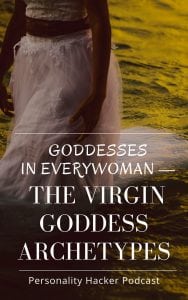Download Episode Here – right click link and select “Save Link As…”
In this episode, Joel and Antonia start a short series talking about the goddess archetypes that show up for some people. This episode details the virgin goddesses in everywoman.
In this podcast you’ll find:
- Animas and Anima – Feminine and Masculine Archetypes
- Goddesses in Everywoman by Jean Bolen
- Gods in Everyman by Jean Bolen
- Doctor and Jungian analyst
- According to Jung: “Archetype is a collectively inherited unconscious idea that is universally present in individual psyches.”
- We start manifesting specific patterns individually and as a group.
- Bolen uses the pantheon of Greek Gods and Goddesses that have survived for thousands of years.
- Anima is Latin for breath, soul, spirit. Animation.
- Jung used anima to describe the inner feminine of men
- Animas is the inner masculine of women.
- Feeler men and Thinker women
- There are seven goddesses we will discuss
- There is one feminine, but it has fractured into different archetypes
- Men can identify with some of these Goddesses as an Anima
- Women will identify with some Gods as their animas
- We can identify with more than one Goddess or God
- Try to identify your shadow archetypes or the parts of you that are less developed.
- All of these energies live inside of us.
- Some are strengths, and some are weaknesses or suppressed.
- These archetypes may show up at different times in our lives.
- They can be triggered by hormonal shifts, age shifts, or life changes.
-
Three categories of Goddesses:
- Virgin Goddesses – characterized by independence. They didn’t belong to anyone.
- Vulnerable Goddesses – Relational Goddesses. Dependent upon relationships with people.
- Alchemical Goddess – neither a virgin nor vulnerable. She chose her companions and path. Never the victim.
-
Virgin Goddesses:
- Artemis
- Hestia
- Athena
-
Vulnerable Goddesses:
- Hera
- Persephone
- Demeter
-
Alchemical Goddess:
- Aphrodite
- Virgin Goddess Archetypes are not driven by a need to please anyone – not even herself.
- They have a guiding star to whatever is true for them
- They have a one-track mind and are focused on whatever is driving them.
-
Artemis was the daughter of Zeus. A very celebrated Goddess.
- She left civilization and dwelt in the forest with nymphs.
- She was the protector of wildlife and young girls.
- She was very earthy. Marked with a bow and arrow.
- Didn’t like to be around people too much.
- Environmentally focused
- Goddess of the hunt but a protector of wild animals.
- She only fell in love once, with Orion.
- Her brother, Apollo, challenged her to hit something floating in the ocean, so she did – and killed Orion.
- Artemis is extremely competitive.
- Examples of Artemis in pop culture:
- Katniss Eberdeen from Hunger Games
- Aria Stark from Game of Thrones
- “Far distant Artemis” – marked by separation. Can be cruel or unkind.
- Artemis can get caught up in the present and forget to build for the future.
- Not terribly creative
- We seem to be in a very Artemis time – Strong independence for women
- Feminist movements
- Artemis women stick together and separate from society, which makes them stronger
-
Athena sprang from Zeus’s head as a full-grown woman.
- She was the goddess of wisdom, crafts and wartime strategy
- A lot of Thinker women identify with Athena energy
- She wears armor
- Credited with giving humanity the bridle to tame the horse
- Strategic and industrious – very productive
- Artemis separated from society and masculinity
- Athena identifies with masculine energy more than female
- Claire Underwood from House of Cards
- Athena women can be very protective of masculine energy and go to bat with Artemis women
- Athena is a feminine archetype, not an Animas
- She is a thinker character and entirely feminine
- Thinker women will likely identify with these two Goddesses
- Artemis is going to identify with TP women who use Introverted Thinking
- Athena is going to identify with TJ women who use Extraverted Thinking
- Feeler women who have conscious Thinking functions may identify with aspects of these Goddesses
- Athenas tend to go with what works and be more industrious
- Athena didn’t have a childhood and Athena women often feel like they didn’t have a childhood.
- So such women need to reclaim their childlike wonder and emotion
- Athenas need to discover their mother, too.
- They also tend not to forgive themselves very well and push themselves too hard
- They feel like they need to be tough because their mothers were missing
-
Hestia is the only Goddess who didn’t have a face
- Hestia is Goddess of the hearth – Zeus’s sister
- Hestia doesn’t make a fuss.
- She is the least known among the Goddesses
- Women who have the Hestia archetype are warm and inviting, and they turn their homes into warm and inviting places.
- Support energy. Enabler.
- They turn housekeeping into a meditative experience.
- Hestia doesn’t demean her activity
- Second wave feminism – big push to remind Artemis and Athena that some women enjoy keeping house. The important thing is the ability to choose.
- Hestia women do activities that are not well celebrated.
- Hestia-like activities are unhurried, like photography.
- The Oracle from the Matrix is a Hestia personality
- Grandma from True Blood
- Luna Lovegood from Harry Potter – maybe
- Hestias can be a little quirky and weird because they are so inwardly focused
- Life Changing Magic of Tidying up by Marie Kondo
- To be devalued is very hurtful to Hestias
- It is hard for Hestias not to have something to hold onto
- The modern world is shifting away from institutions which Hestia finds comfortable.
- Hestias can acquire assertiveness by developing Artemis or Athena energy and learn to fight for themselves
- Hermes Animas
- Hestia and Hermes are frequently together
- Hestia was the hearth and Hermes was a pillar in the front of the house
- Inward and outward facing energy
- Hestia can develop the Hermes Animas to give her a front facing piece so she can be more assertive
- Hermes is a lot of fun. We will cover him in the Gods podcast
- We tend to overidentify with our experience. Don’t overvalue one Goddess over another
- Recognize the differences and honor them.
- Three vulnerable goddesses are coming up next
- Can you fit some of these archetypes in your life?
- We tend to deny our anima/animas
- Identify and integrate these parts of you
To subscribe to the podcast, please use the links below:
Subscribe with iTunes
Non-iTunes Link
Download The Android App
Subscribe on Soundcloud
Subscribe with Stitcher
Subscribe on Google Play
Subscribe with Facebook Messenger
If you like the podcast and want to help us out in return, please leave an honest rating and review on iTunes by clicking here. It will help the show and its ranking in iTunes immensely! We would be eternally grateful!
Want to learn more?
Discover Your Personal Genius
We want to hear from you. Leave your comments below…



Share:
Podcast - Episode 0232 - Being A Good Listener
Podcast - Episode 0234 - Goddesses In Everywoman — The Vulnerable Goddess Archetypes
28 comments
I’m an INFJ 4w5 and relate to Persephone.
I also have 9 in my tritype and relate to Hestia.
I loved Pleasantville!
I’m also an INFJ that relates to Hestia.
First of all this is such a beautiful series, I love it. I totally identify with the Artemis and Athena qualities with a slight preference for Athena, because I am not that earthy or tactical, although I hang out with women more for example. Artemis reminds me of this highschool girl from a prestigious female only school who is popular with other girls, but really hates guys and is the girl to tell her friend to stop seeing a guy because they’re vile or something.
Haha, and my mom is more Athena than I am so I didn’t raise nobody. She was also an Artemis so yeah.
On Hestia however: you know there are a lot of Hestia female characters in Japanese animes in my opinion, because they have more traditional views still of women and how they should be and it’s not bad to be Hestia-like. It’s actually almost preferred, because of how comforting and how important of a cog she can be to making the social machine work. She is quiet, doesn’t complain and does her part, no matter how looked down upon the work is. It’s almost viewed as noble.
I find Nico Robin from One Piece has a lot of Hestia qualities put in her. She is quiet, always smiles warmly (and mysteriously), she is never bombastic you’ll never see her hurry up even if the situation probably calls for it, the way she fights is by confusing others with the way her power works (she grows arms out of her body) that catches the enemy off-guard so she has time to bend people backwards to crack their back and leave them in pain without rushing anything. That doesn’t mean they didn’t put other qualities in her of course, but the Hestia quality is really something I see a lot in Japanese animes or dramas.
In Cells at Work you can find Macrophages being very warm, drinking tea quietly, they’re actually dressed as housemaids and you’ll find them holding a broom sweeping the floor inside a home, or nurturing the younger red blood cells before they can go out and work. And when it’s their turn to kill bacteria, they actually work slow. They show up late to wherever the bacteria are wreaking havoc.
But then Japanese creators really like their weird extreme contrasts so you’ll see the Macrophages killing bacteria with a really warm smile as their face gets splattered by their blood. Robin has that weird contrast too where she has a really morbid sense of humor for example. So she’ll freak her crew mates out. Actually it’s really unlike a Hestia archetype to even join a pirate crew, but somehow the creator is making it work and you’ll find her quietly sipping coffee somewhere on the ship, sitting in the sun reading a book.
I think in the US it’s very important to be bombastic and have a clear personality, but know that in other parts of the world the more quiet, gracious and warm quality is preferred so don’t feel bad. And then you have the Netherlands who want you to be clear on who you are but they don’t want you to be bombastic. A famous Dutch saying: “doe normaal dan doe je al gek genoeg.” Paraphrased it means: “act normal, that’s already crazy enough.”
My point is there are a lot of variations of what energy or archetype is preferred depending on the country you’re in and you don’t have to perfectly match it or you can find a growth-path in participating if that’s what you do too little of.